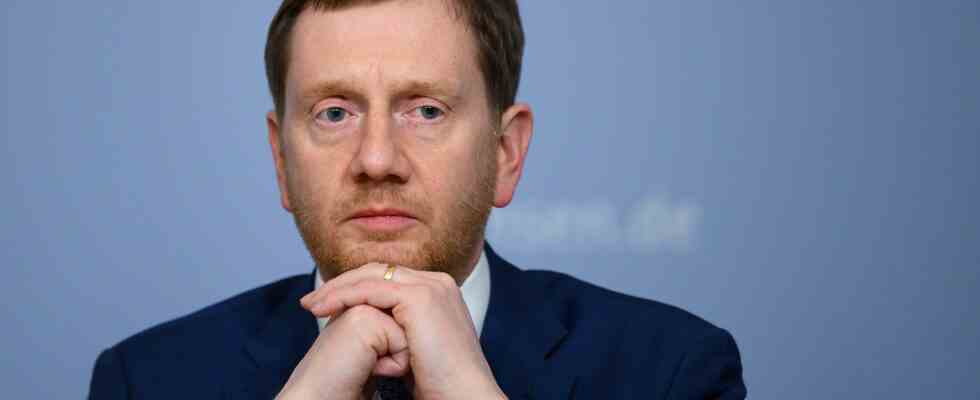analysis
As of: 07/21/2022 7:31 p.m
Saxony’s Prime Minister Kretschmer is again attracting attention with statements about Russia. In the Union, he reaps opposition to it – but his attitude is apparently accepted. But why?
Foreign policy always thrives on images. And with Michael Kretschmer’s attempts at foreign policy, one image in particular has burned in: In April 2021, Kretschmer is sitting on a historic sofa in Moscow and is on the phone with Vladimir Putin. An image that quickly caused ridicule, because the Kremlin boss did not personally receive the Saxon Prime Minister and so the only option was to pick up the phone. In Moscow, mind you.
Although Kretschmer was coldly dumped diplomatically at the time, he was not discouraged. Despite thousands of deaths in the Russian war of aggression against Ukraine, Kretschmer wants to continue to rely on diplomacy.
And his basic position is always the same: he condemns the Russian war of aggression in Ukraine and at the same time warns not to push Russia too far into a corner and not to consider the consequences. For the Prime Minister of Saxony, the consequences are currently an uncertain gas supply and high gas prices in Germany and especially in Saxony.
Kretschmer wants to “freeze” the conflict
Kretschmer wants Germany to work to ensure that “this conflict is frozen.” Foreign politicians from different parties consider this attitude to be naïve and also incomprehensible.
It completely ignores reality, after all Russia is waging an imperial war, says SPD foreign policymaker Nils Schmid, for example. Other foreign experts emphasize that the UN Secretary General, the French President and the German Chancellor have sought talks with Vladimir Putin. Several times and without success. However, Kretschmer received approval for his position from an unexpected source.
AfD and parts of the left support Kretschmer’s initiative
His initiative met with approval from AfD leader Tino Chrupalla, against whom Kretschmer lost his federal constituency in 2017. And he gets support from left-wing politician Sahra Wagenknecht. And so the deputy CDU federal chairman Kretschmer is again in line with the AfD and at least parts of the left on the Russia question. And something else unites Kretschmer, Chrupalla and Wagenknecht – they all have an East German biography.
If you take a look at surveys of the East German population, then support for Russia sanctions has fallen sharply there if this results in disadvantages for Germany. Last week, the Federal Government Commissioner for East Germany, Carsten Schneider, SPD, also warned of social tensions caused by high energy prices in East Germany. The fears of being left behind again are great there.
Kretschmer’s individual opinion in the Union
Back in the spring, at the closed meeting of the new CDU board in St. Ingbert, Saarland, the party discussed its stance on the Russian war of aggression. Even then, Kretschmer had made known his individual opinion on how to deal with Putin’s Russia.
Party leader Friedrich Merz has since allowed his deputy party leader to do as he pleases, but himself continues to defend Germany’s and the EU’s sanctions policy against Russia. Merz continues to believe that the sanctions against Russia are correct, at least “as long as this war of aggression rages on in Ukraine.”
From unconditional support for Ukraine to Kretschmer’s vague desire to “freeze” the Russian war of aggression in Ukraine – the leadership of the CDU has had to deal with an astonishing polyphony.
The fear of an energy shortage is there
But the fear of an energy bottleneck is particularly great in eastern and southern Germany – the CDU party leadership could be quite right there if not only the AfD and the left respond to these fears in the population.
And at least surprising were the statements of the new CSU General Secretary Martin Huber. At the weekend he answered evasively in the “Münchner Merkur” when asked whether the CSU wanted to stick to all Russia sanctions without ifs and buts.
This time party leader Söder captured these statements and backed the “nationally agreed” sanctions course. It will be interesting to see whether this will remain the case in the event of a possible gas emergency in winter.

